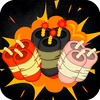American Born Chinese Review
A captivating evaluation of the Asian-American experience with a huge side assisting of magic.

Upgraded:
May 26, 2023 6:41 pm
Published:
May 26, 2023 6:40 pm
When Jin Wang (Ben Wang) learns that the gods and characters from Chinese folklore and folklore are incredibly, really real, he accepts the news with little to no surprise because American Born Chinese is set in the present. Since Jin desperately wants to just be normal, it is initially difficult to see how quickly he seizes the chance to help new kid Wei-Chen (Jimmy Liu), even after learning that his new friend is the fleeing child of Sun Wukong, the renowned Monkey King. Jin’s resignation as an audience member seemed understandable to me once a number of celestial beings appeared swiftly after another; after all, what could a high school student possibly do to stop the planet from being overrun by gods?
Chinese American Stills
This programme is blatantly powerful. The fact that it is both a martial arts coming-of-age story and clearly has something to say about the Chinese-American/universal immigrant experience indicates that it dives headfirst into East Asian storytelling principles and elements. There is at least one combat in every episode, a significant portion of the dialogue is spoken in Mandarin, debates are heavily influenced by comic books and manga, Beijing Opera, and Wuxia (Chinese martial arts historical dream) are all commonplace. While it doesn’t quite achieve the same Oscar-worthy status as Everything, Everywhere, All at Once, American Born Chinese can be seen as a sort of young adult version of that movie. It fully embraces that movie’s spirit of having a complete absence of pity in every move it makes and the many different sources it draws from.
How are those movements going? Those elements had to be rock-solid with anything that evolved around the fantastic, the magical, and the martial arts, and they are. The distinctive effects, composition, and attire are remarkable and not only successfully capture the transcendent nature of the inhabitants of the paradises but also make an attempt to occasionally poke fun at how absurd it all is. There is never action for the sake of action; the fighting and choreography are crisp, engaging, and make sense when they are used in the narrative. In the style of Jackie Chan or Stephen Chow, I sort of expected the battle scenes to have a humorous element to them, but for the most part, they don’t—which is great. Every exchange of blows is significant and is handled with consideration for the possibility that everyone’s collective worlds may come to an end should the wrong warrior emerge as the victor.
Genuine standout performances come from Ke Huy Quan and Daniel Wu.
Writing with mythological figures can be difficult because they have essentially been pre-loaded for a very long time, and this programme does not break that rule. I’d say that, even among the more earthly personalities, I’m not convinced many of them have much core character. This isn’t always a bad thing, though, because of what the story is trying to accomplish: Wei-Chen and Jin are both searching for themselves and figuring out exactly who they want to be, as are Jin’s parents, who are also trying to figure out who they are in the midst of culturally inspired marital issues, and the more godly characters remain with “function playing,” for lack of a better term; they all obviously have a role to play in this hero’s journey and do
That’s fine, too! They are obviously using the tried-and-true formula of the American coming-of-age story, but they are inserting characters and points of view that many people would not be familiar with. This is also not to say that any actor or actress did a poor job portraying their role. The majority of the performances are respectable, but Ke Huy Quan as Jamie Yao/Jimmy Wong and Daniel Wu as Sun Wukong are two real standouts.
Every thing Quan says resounds that much more authentically and naturally since he frequently plays characters who are the actual manifestation of his Oscars acceptance speech. His character Jamie Yao, a reimagining of the caricature Chin-Kee from the graphic novel, regrets having really played “America’s preferred next-door neighbour” Jimmy Wong on a vintage in-universe television programme. It’s safe to say that the entire concept is somewhat meta because I’m not sure if another actor could have performed the role without coming across as preachy.
And despite being a part of a cast that includes rising stars and Oscar contenders, Daniel Wu by far delivers the best performance in the entire production. Wukong, who is normally portrayed as carefree, conceited, and power-hungry, is depicted in this scene as a horrified father who loses his child as a result of the, um, monkey-like behaviour of his younger self. This isn’t the Monkey King’s first adaptation—far from it, as even American Born Chinese points out—but it might be my favourite because of the way Wu writes about him and the way he performs, which makes him seem like a real person rather than just a war-hungry but attractive trickster god. Even his fighting style occasionally seems desperate, which is never something I’d say about the guy who is perhaps most known to people now as Goku from Dragon Ball.
The fact that the story’s central theme is acceptance of individuality seems to be secured by the program’s decision to keep the name “American Born Chinese.” This is examined through pretty much every character that isn’t portrayed by Michelle Yeoh, who emerges as a goddess of grace and empathy in a largely complete package. The only problem I occasionally had with this was that because everyone was doing it, primary man Jin wasn’t given enough time to feel fully prepared. His character development happens quickly in the final few minutes of both the first and finale episodes, and it happens in a very “inform disappoint” way. As a result, he comes off as a little unrelatable.
My determining factor in everything, even with some uninteresting character possibilities and certain slow-starting styles and concepts, is “did I have a good time?” Watching American Born Chinese was a blast. Though you certainly did not have to be a fan of Mr. Yang, his work, or possibly Chinese fairy tales to appreciate seeing, the most pleasurable aspect was seeing it as a whole as a true love letter to whatever Gene Luen Yang has to do with and displays in all of his comics. The rethinking of the finale, though, was a key aspect I didn’t enjoy. While I won’t spoil everything, I will say that as a fan of the graphic novel, I strongly disagree with it. Insufficient to undo the benefits of the programme properly, but it does give me some pause.
Decision
A well-deservedly renowned graphic novel, American Born Chinese is a delightful, compelling reinterpretation of the classic American coming-of-age story that incorporates Chinese folklore. There are a lot of moving components that happen quickly, but when they’re all put together with fantastic combat choreography, it works in a truly engaging way. The storytelling falls a little short on some of the more enthusiastic ideas it offers, but none of it takes away from the joy or enjoyment I felt watching people discover their true selves through Wuxia god nonsense, all on the strength of exceptional performances from Ke Huy Quan and Daniel Wu.
In This Article

fantastic
American Born Chinese is an engrossing and unapologetically honest examination of the Asian-American experience that also includes a lot of magic, folklore, monkeys, and martial arts, all the while conveying its incredibly important message.

























